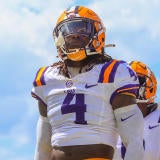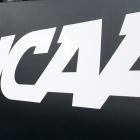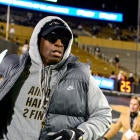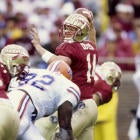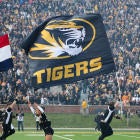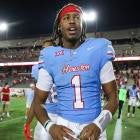The one assurance this week of the NCAA convention seems to be that athletes are going to get paid -- more -- in some way, shape or form. Thanks to increasing outcry for athletes' name, image and likeness rights, they will be getting more than the baseline room, board, books, tuition and fees that for most of the past 70 years has separated college athletes from being pros. At least in the NCAA's eyes.
The whole definition of the so-called "collegiate model" is up for debate as schools gather in Anaheim, California, for the convention. At the front of everyone's conversation, frontal lobe and tip of the tongue will be the aforementioned issue.
The NCAA is increasingly on board to allow athletes to earn money from endorsements, autographs, commercials, even their own shows -- stuff that would have rendered them ineligible previously.
While no changes are expected this week, the discussion is heating up. It's fair to say by the end of the year the NCAA has we know it may not look the same because of those name, image and likeness rights. Legally and politically, the NCAA may have no choice but to change. Morally, it is simply becoming the right thing to do.
"I never thought I'd hear myself say this, but I think it's necessary," ACC commissioner John Swofford told CBS Sports. "I've never felt like that before in my entire career. I'm not sure we can solve this appropriately from within [the NCAA structure]."
Name, image and likeness rights are essentially a birthright in our democratic society. It allows a four-eyed kid from dusty West Texas to become a rock icon. (Hello, Buddy Holly.) It allows quasi-medical professionals to become ratings winners with some help from Oprah Winfrey (talking about you Dr. Oz and Dr. Phil). And God bless America, Judge Judy makes $40 million a year handing down decisions from the bench on trivial domestic issues.
But NCAA athletes have long been denied the ability to profit from so much as their autograph and their name on the back of a jersey.
Contrary to assumptions, this new-found money most likely wouldn't come from schools. Some of it would come from high-powered corporate entities literally waiting in line for the archaic NCAA amateurism walls to be torn down. Some of it would come from the still-emerging technologies. Two years ago, UCF kicker Donald De La Haye was ruled ineligible after refusing to accept NCAA waiver conditions regarding profiting from his YouTube videos.
Unfair? So has been the ban on these rights. It seemed such a waste, the college experience sacrificed for the preservation of what has become an ill-defined collegiate model.
Waiting in the wings already are companies like OneTeam Partners. Without getting too far into weeds, OneTeam was formed by the MLB and NFL Players Associations to "commercialize player intellectual property." Read between the lines and OneTeam would be the go-between in getting the popular EA Sports "NCAA Football" video game back online. The game was discontinued in 2014 when court challenges to the NCAA's sovereignty on the matter became too risky.
That was six years ago. The game could be back, soon, if these rights are approved.
"We come in peace," OneTeam CEO Ahmad Nassar said. "We're not here to play a zero-sum game. We come bearing gifts. We think our group licensing platform is for everyone to make money."
Imagine that as a brief glimpse at a new-look NCAA. We got this point because in a $1 billion industry too much power, and money was concentrated at the top. Too little went to the players.
The lords of the game have done a historically bad job revealing what money did trickle down. An SEC athletic director told CBS Sports that if certain athletes live off campus and max out on cost of attendance and their Pell Grant (federally subsidized education income), he/she can make -- make -- $30,000 a year.
Clemson AD Dan Radakovich said his athletes max out between $25,000-$30,000 annually.
Shouldn't that be enough? Well, no. First, not everyone gets that amount. Second, even the ability to get that amount of money is capped. The NCAA has fought what looks like a losing battle in the courts trying to justify why it has been capped. The athletes who have been banned from financially maximizing their own humanness over the years will soon be able to profit from it.
It's just a matter of how for an NCAA struggling to retain some relevancy. Increasingly, college administrators are coming to the conclusion that these rights must be granted. De La Haye can't happen again.
"There's so many questions that if you try to answer them all individually you'll go insane," Radakovich told CBS Sports. "So let's just start and fix the problem that created this issue in the first place. We now have a runway to do that and a lot of momentum to do that."
Name, image and likeness will be the No. 1 subject at the convention with critics, courts and the federal government bearing down on the NCAA. The association has said it will take at least until next year's convention to develop formal legislation.
It may not have that long. At least 16 states are developing their own such laws that would allow athletes to profit. The NCAA seemingly can't afford the legal gambit of putting out fires in 16 different states. NCAA president Mark Emmert has recently cozied up to Congress, suggesting federal intervention may be the answer. In other words: Save us from ourselves by developing national standards.
"This is a huge, huge issue for the association," Emmert said, "as big a one as we've seen in modern times."
State and national intervention has become so attractive because it is a bipartisan issue. Politicians can sell name, image and likeness rights as student-athlete welfare to their constituents. It would be in the NCAA's best interest to get onboard. Let's face it, the association's rep could use a boost.
California started the national momentum by adopting the "Fair Pay To Play Act" in September. 2019 The law due to go into effect in January 2023 would make it illegal at California-based universities for the NCAA to revoke an athlete's scholarship or eligibility for taking money above those basics listed above.
Emmert sent a June letter to California politicians threatening to withhold NCAA championships from the state and rule players ineligible if the law is enacted.
That did not sit well with the bill's sponsors or nationally with those tired of the NCAA antiquated flexing.
"I've probably visited two dozen congressional offices the last two months. Everyone wanted to talk about NIL," said David Ridpath, an Ohio University professor and president of the Drake Group, a collegiate reform organization. Everyone was like, 'This absolutely has to happen.' All of these things are to give athletes more of a voice."
In a letter to Emmert last month, the reform-minded Knight Commission called for the NCAA to restructure college sports.
"It's clearly gotten out of their control," said Amy Perko, the Knight Commission's chief executive officer. "The best opportunity to try to control it is to get federal legislation."
The commission cited "the highly commercialized environment" of major-college football. Knight Commission co-chair Arne Duncan, the former Department of Education secretary, suggested big revenue programs might be placed in a different division outside of the NCAA.
Perko questioned the 65 Power Five schools basically running the College Football Playoff and its $7.2 billion contract with ESPN with no NCAA oversight.
"We think there is a lack of accountability for the College Football Playoff," she said.
Ironically, part of the collegiate model that defines the NCAA version of amateurism basically states that athletes live as close as the same life as possible to that of normal students.
That, of course, is almost impossible these days. The trade for that free scholarship is a de facto job requiring a 40- to 50-hour work week to train for even the most obscure sports.
They may not be penniless, but they can't earn much of anything for their labors.
Complicating all of it is recruiting. Simply allowing players more compensation is fairly easy. Throw in the evitable unscrupulous boosters, and things could get out of control.
"There is no question, knowing mankind, this will gravitate to the lowest common denominator," UTEP AD Jim Senter said. "How can we leverage whatever the rules are to help our schools get the best players? It's about me getting the best player for my school so my school wins so I can beat my chest about how, 'I'm Alabama and I beat Georgia.' That's what scares me."
"That's what makes this so challenging," Swofford said. "People say, 'Just use the Olympic model or something similar to it.' That's all well and good, but the Olympics don't recruit. We're the one entity sports-wise where recruiting comes into play."
In the end, does it matter if the star quarterback gets a $1 million to endorse a product? Former Oklahoma quarterback Kyler Murray signed a $5 million deal with the Oakland A's and remained eligible in football because it was in a different sport.
Collegiate swimming didn't get out of whack when former Texas swimmer Joseph Schooling got $740,000 from his home country of Singapore for winning Olympic gold.
What, really, is wrong with that? If only the NCAA would approve it.
"When you can give somebody a bag underneath the table and nobody knows about it, that's a whole different story than having it above board," Ridpath said.







